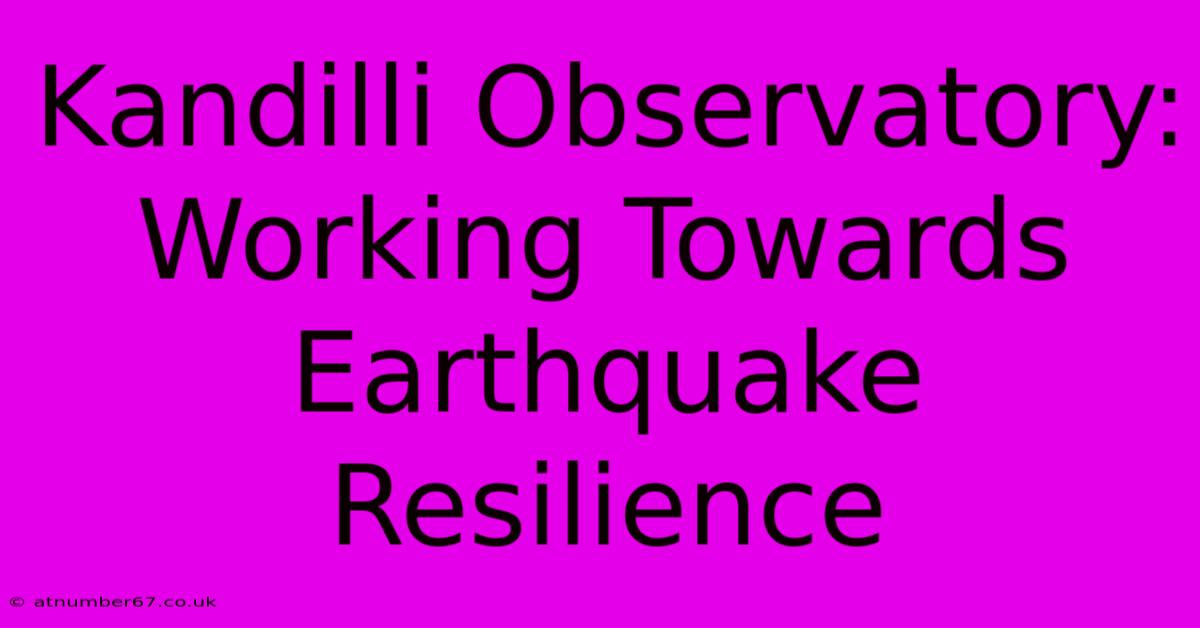Kandilli Observatory: Working Towards Earthquake Resilience

Table of Contents
Kandilli Observatory: Working Towards Earthquake Resilience
Turkey, situated on major fault lines, faces a significant risk of earthquakes. Understanding these risks and mitigating their impact is crucial, and at the forefront of this effort is the Kandilli Observatory and Earthquake Research Institute (KOERI). For over a century, KOERI has played a vital role in monitoring seismic activity, researching earthquake mechanics, and contributing to the development of earthquake-resilient infrastructure in Turkey and beyond.
A Legacy of Seismic Monitoring
Established in 1868, Kandilli Observatory initially focused on astronomical observations. However, its role evolved significantly following devastating earthquakes, solidifying its position as a leading seismological institution. Its network of seismic stations across Turkey provides real-time monitoring of earthquake activity, generating crucial data for early warning systems and post-earthquake assessments. This comprehensive monitoring network is the backbone of Turkey's earthquake preparedness strategy.
Key Functions of Kandilli Observatory:
- Real-time Earthquake Monitoring: KOERI's extensive network of seismic stations instantly detects and locates earthquakes, providing critical information to authorities and the public. The speed and accuracy of this data are vital for immediate response efforts.
- Earthquake Early Warning Systems: Building upon real-time monitoring, KOERI contributes significantly to the development and improvement of earthquake early warning systems (EEWS). These systems provide precious seconds of warning before strong shaking arrives, allowing for automated shutdowns of critical infrastructure and giving people time to take protective action.
- Seismic Hazard Assessment: KOERI conducts extensive research to assess seismic hazards across Turkey. This involves studying historical earthquake data, analyzing geological formations, and using advanced modeling techniques to predict potential future earthquake scenarios. This crucial information guides urban planning and building codes.
- Earthquake Engineering Research: KOERI collaborates with engineers and architects to improve earthquake-resistant building design. Research on building materials, construction techniques, and structural resilience contributes directly to safer infrastructure.
- Public Awareness and Education: KOERI plays a crucial role in educating the public about earthquake preparedness. Through workshops, publications, and public outreach programs, they empower communities to take proactive steps to protect themselves and their families.
Beyond Monitoring: Research and Innovation at KOERI
Kandilli Observatory is not just a monitoring station; it's a vibrant center for scientific research. Scientists at KOERI are constantly pushing the boundaries of seismological understanding, employing cutting-edge technologies and innovative research methodologies.
Areas of Ongoing Research:
- Earthquake Prediction: While precise earthquake prediction remains a significant challenge, KOERI's research explores potential precursors to major seismic events. This involves analyzing subtle changes in ground deformation, seismic wave patterns, and other geophysical phenomena.
- Tsunami Warning Systems: Given Turkey's coastal location, KOERI also focuses on tsunami research and warning systems. Understanding tsunami generation mechanisms and developing effective warning systems is critical for coastal communities.
- Seismic Microzonation: KOERI conducts detailed studies to map the varying seismic hazards within specific regions. This microzonation approach enables more precise risk assessments and informs targeted mitigation strategies.
The Importance of International Collaboration
KOERI actively participates in international collaborations, sharing data and expertise with seismological institutions worldwide. This global network is essential for improving our collective understanding of earthquakes and for enhancing earthquake preparedness strategies on a global scale. The sharing of best practices and research findings strengthens the global response to seismic events.
Conclusion:
The Kandilli Observatory and Earthquake Research Institute is a critical institution for Turkey and the global community. Its dedication to earthquake monitoring, research, and education is crucial for building more resilient communities and mitigating the devastating impact of earthquakes. Their ongoing work exemplifies the vital role of science and technology in facing the challenges posed by seismic hazards. The commitment to innovation and collaboration ensures that KOERI will continue to be a leader in the global effort to enhance earthquake resilience for years to come.

Thank you for visiting our website wich cover about Kandilli Observatory: Working Towards Earthquake Resilience. We hope the information provided has been useful to you. Feel free to contact us if you have any questions or need further assistance. See you next time and dont miss to bookmark.
Featured Posts
-
Rich Paul Net Worth Facts And Figures
Apr 01, 2025
-
Fahad Mustafas Daughter Balancing Fame And Family
Apr 01, 2025
-
Suzy Sheeps Dad A Story Of Love And Family
Apr 01, 2025
-
Bugoy Carino Age An Icons Timeless Appeal
Apr 01, 2025
-
I Became The Villains Lost Daughter My Unexpected Inheritance
Apr 01, 2025
